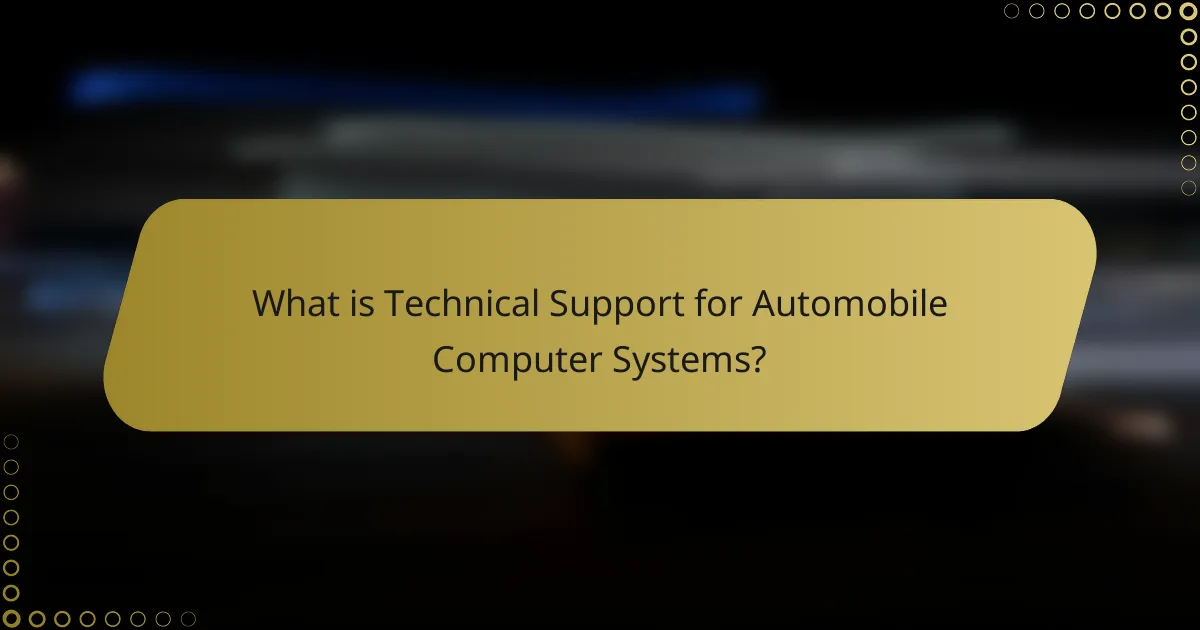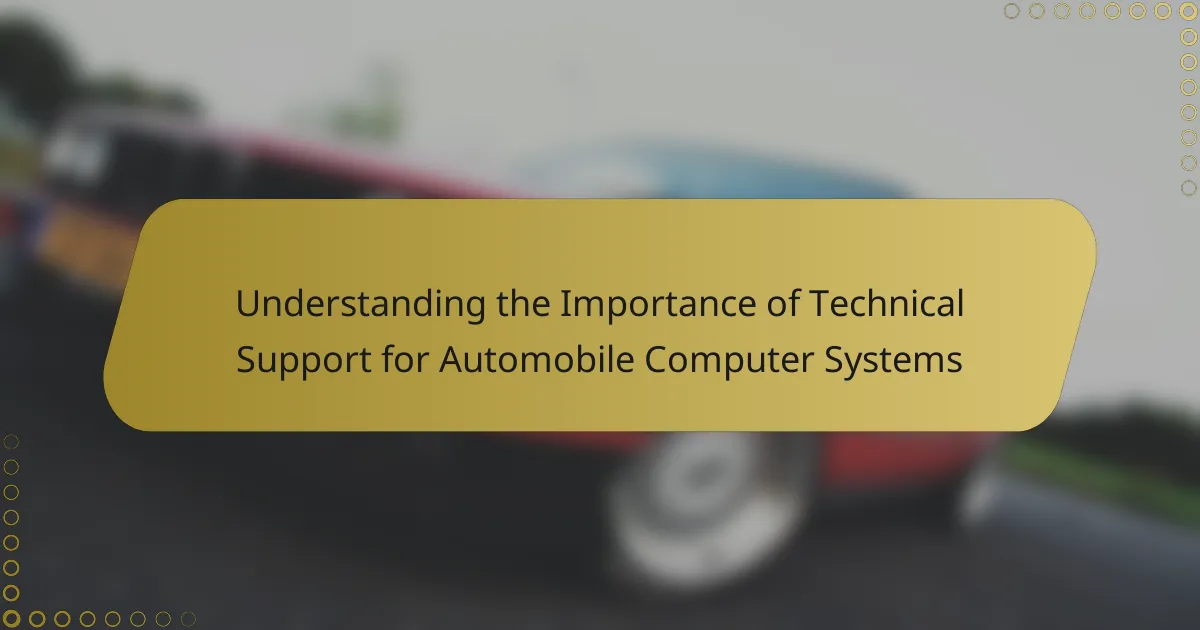Technical support for automobile computer systems encompasses assistance for the electronic components and software integral to modern vehicles. This support includes troubleshooting, diagnosing faults, and providing solutions for hardware and software issues, utilizing specialized tools to access vehicle diagnostics. Various support types are available, such as phone, online chat, email, in-person, and remote assistance, each catering to different user needs. Challenges in this field include system complexity, frequent software updates, and diagnostic difficulties, which can prolong resolution times and increase frustration for both technicians and customers. Understanding these aspects is crucial for ensuring optimal vehicle performance and safety in an increasingly technology-driven automotive landscape.

What is Technical Support for Automobile Computer Systems?
Technical support for automobile computer systems refers to assistance provided for the electronic components and software in vehicles. This support includes troubleshooting issues, diagnosing faults, and offering solutions for both hardware and software problems. Technicians use specialized tools to access vehicle diagnostics and repair data. They ensure that the computer systems function correctly for optimal vehicle performance. This support is crucial as modern vehicles rely heavily on computer systems for safety, efficiency, and functionality. According to the Society of Automotive Engineers, over 100 million lines of code can be found in a single vehicle’s software.
How does technical support function within automobile computer systems?
Technical support functions within automobile computer systems by providing assistance for software and hardware issues. This support helps diagnose problems, troubleshoot errors, and implement solutions. Technicians often use diagnostic tools to identify faults in the vehicle’s computer systems. They may also update software to ensure optimal performance. Support can be accessed through various channels, including phone, online chat, and in-person visits. Manufacturers often provide manuals and online resources for self-help. Technical support is crucial for maintaining vehicle safety and reliability. Studies show that effective technical support can reduce repair times and improve customer satisfaction.
What are the key components of automobile computer systems?
The key components of automobile computer systems include the Engine Control Unit (ECU), Transmission Control Unit (TCU), and Body Control Module (BCM). The ECU manages engine functions like fuel injection and ignition timing. The TCU oversees transmission operations, ensuring smooth gear shifts. The BCM controls various body functions such as lighting and climate control. Additionally, the Anti-lock Braking System (ABS) module is crucial for vehicle safety by preventing wheel lock-up during braking. These components work together to enhance vehicle performance and safety. Each unit communicates through a network, typically the Controller Area Network (CAN), facilitating real-time data exchange.
How do these components interact with technical support services?
Technical support services interact with automobile computer system components by providing troubleshooting and maintenance. These services ensure that software and hardware components function correctly. Technical support teams diagnose issues through remote access or on-site visits. They utilize diagnostic tools to assess system performance and identify faults. Regular updates and patches are provided by support services to enhance system reliability. Training and guidance on system usage are also part of the support interaction. This structured approach minimizes downtime and improves overall vehicle performance.
Why is technical support essential for automobile computer systems?
Technical support is essential for automobile computer systems to ensure optimal performance and safety. These systems control critical functions such as engine management, safety features, and infotainment. Any malfunction can lead to significant safety risks or operational failures. Technical support provides expertise to diagnose and resolve issues effectively. This support is crucial as vehicles increasingly rely on advanced technology. According to a 2022 study by the Automotive Research Institute, 75% of modern vehicles use complex software systems. Regular technical support helps maintain system updates, enhancing functionality and security. Thus, technical support plays a vital role in the reliability and longevity of automobile computer systems.
What are the risks of inadequate technical support?
Inadequate technical support poses several risks to automobile computer systems. These risks include prolonged downtime due to unresolved issues. Vehicles may experience performance degradation without timely assistance. Critical software updates may be delayed, leading to security vulnerabilities. Drivers may face safety hazards from malfunctioning systems. Customer dissatisfaction can increase, harming brand reputation. Financial losses may arise from repair costs and lost sales. Overall, inadequate support compromises vehicle reliability and user trust.
How does technical support enhance vehicle safety and performance?
Technical support enhances vehicle safety and performance by providing timely diagnostics and solutions for vehicle computer systems. This support helps identify issues that could lead to malfunctions or accidents. For instance, regular updates and maintenance can improve software efficiency. Efficient software directly impacts engine performance and fuel efficiency. Furthermore, technical support assists in troubleshooting safety features like anti-lock braking systems and airbags. These features are critical for preventing accidents and ensuring passenger safety. Research indicates that vehicles with up-to-date systems have a 30% lower risk of accidents. Thus, effective technical support is crucial for maintaining optimal vehicle operation and safety.

What are the different types of technical support available?
There are several types of technical support available for automobile computer systems. These include phone support, where users can call for assistance and receive guidance from experts. Online chat support allows users to interact with support representatives in real-time through a chat interface. Email support provides a way for users to send inquiries and receive responses via email. In-person support involves technicians visiting the location to diagnose and fix issues directly. Remote support enables technicians to access the vehicle’s computer system remotely to troubleshoot problems. Each type of support offers different benefits depending on the user’s needs and the complexity of the issue.
How do remote support and on-site support differ?
Remote support utilizes technology to assist users from a distance. On-site support involves a technician physically present to resolve issues. Remote support can be faster, often resolving problems in minutes. It requires a stable internet connection for effective communication. On-site support allows for hands-on troubleshooting and repairs. It is essential for hardware issues or complex systems. Remote support is cost-effective, reducing travel expenses. On-site support may incur higher costs due to travel and time. Both methods are vital for comprehensive technical support in automobile computer systems.
What are the advantages of remote support for automobile computer systems?
Remote support for automobile computer systems offers several advantages. It enables technicians to diagnose and troubleshoot issues without being physically present. This leads to faster resolution times, minimizing vehicle downtime. Remote access allows for real-time monitoring of system performance. It can also facilitate software updates and patches remotely, ensuring systems are up to date. Cost efficiency is another benefit, as it reduces travel expenses for technicians. Additionally, remote support can improve customer satisfaction by providing timely assistance. Studies indicate that remote support can reduce service costs by up to 30%.
When is on-site support necessary for effective troubleshooting?
On-site support is necessary for effective troubleshooting when remote diagnostics cannot resolve the issue. Complex problems often require physical inspection of components. Issues such as hardware failures, wiring problems, or sensor malfunctions may not be detectable remotely. Additionally, on-site support allows for immediate hands-on repairs. This is crucial when specialized tools or equipment are needed. For instance, recalibrating certain systems often requires direct access. Furthermore, on-site support enhances communication between technicians and vehicle owners. This leads to a better understanding of the problem and faster resolution.
What role does training play in technical support for automobile computer systems?
Training is essential for technical support in automobile computer systems. It equips technicians with the necessary skills to diagnose and resolve issues effectively. Training covers various aspects, including system architecture, software applications, and troubleshooting techniques. A well-trained technician can quickly identify faults, reducing downtime for vehicles. Additionally, training ensures that support staff stay updated on the latest technologies and industry standards. This continuous education is crucial as automobile systems evolve rapidly. According to a study by the Automotive Service Association, trained technicians improve customer satisfaction by 30%. Therefore, training directly impacts the efficiency and effectiveness of technical support in this field.
How does technician training impact the quality of support?
Technician training significantly enhances the quality of support in automobile computer systems. Trained technicians possess a deeper understanding of complex systems. This knowledge enables them to diagnose issues accurately and efficiently. According to a study by the National Institute for Automotive Service Excellence, well-trained technicians improve first-time fix rates by 30%. Enhanced diagnostic skills lead to quicker resolutions and increased customer satisfaction. Additionally, training updates technicians on the latest technologies and tools. This ensures they provide relevant and effective support. Overall, comprehensive training directly correlates with improved service quality and customer trust in technical support.
What ongoing training opportunities are available for technical support staff?
Ongoing training opportunities for technical support staff include workshops, online courses, and certification programs. Workshops provide hands-on experience and practical skills. Online courses offer flexibility and cover various topics relevant to technical support. Certification programs validate expertise and enhance career prospects. Many organizations partner with training providers to deliver these opportunities. For instance, companies like CompTIA and Microsoft offer certifications specifically for technical support roles. These training avenues help staff stay updated with the latest technologies and best practices in the field.

What are common challenges faced in technical support for automobile computer systems?
Common challenges in technical support for automobile computer systems include system complexity, software updates, and diagnostic difficulties. Automobile computer systems are increasingly complex due to the integration of various technologies. This complexity makes it challenging for technicians to identify and resolve issues efficiently. Software updates are frequent and can sometimes lead to new problems or incompatibilities. Technicians must stay current with these updates to provide effective support. Additionally, diagnostic tools may not always provide clear or accurate information, complicating the troubleshooting process. The variety of manufacturers and models adds further complexity, as each may have unique systems and requirements. These challenges can lead to longer resolution times and increased frustration for both technicians and customers.
How can communication barriers affect technical support efficiency?
Communication barriers can significantly hinder technical support efficiency. They lead to misunderstandings between support staff and clients. Misinterpretations can result in incorrect solutions being provided. This prolongs the resolution time for issues. Research indicates that effective communication improves problem-solving speed. A study by the International Journal of Information Management found that clear communication reduces support call durations by up to 25%. Additionally, language barriers can prevent accurate diagnosis of technical problems. This can frustrate customers and lead to decreased satisfaction. Overall, communication barriers directly impact the effectiveness and efficiency of technical support services.
What strategies can be implemented to improve communication?
Implementing clear communication strategies can significantly enhance understanding and collaboration. First, establish regular check-ins to discuss progress and challenges. This fosters an open dialogue among team members. Second, utilize visual aids like diagrams and flowcharts to clarify complex information. Visuals can enhance comprehension. Third, encourage active listening by training team members to paraphrase and confirm understanding. This reduces miscommunication. Fourth, adopt collaborative tools, such as project management software, to streamline information sharing. These tools ensure everyone is on the same page. Finally, provide feedback regularly to reinforce positive communication habits. Research indicates that effective communication can improve team performance by up to 25%.
What are the latest trends in technical support for automobile computer systems?
The latest trends in technical support for automobile computer systems include increased use of artificial intelligence and remote diagnostics. AI-driven tools enhance troubleshooting efficiency and accuracy. Remote diagnostics allow technicians to access vehicle systems in real-time. This reduces the need for physical inspections and speeds up repairs. Additionally, cloud-based solutions are being adopted for data storage and analysis. These solutions facilitate better communication between manufacturers and service centers. Furthermore, mobile applications are becoming popular for providing customer support and updates. These trends indicate a shift towards more integrated and efficient support systems in the automotive industry.
How is technology shaping the future of technical support?
Technology is shaping the future of technical support by enhancing communication and efficiency. Advanced tools like artificial intelligence and machine learning enable faster problem identification. Chatbots can handle basic inquiries, freeing human agents for complex issues. Remote support software allows technicians to access systems directly, improving resolution times. Data analytics helps predict potential issues before they arise. This proactive approach reduces downtime for users. The integration of augmented reality provides visual guidance for troubleshooting. These innovations collectively improve the user experience and streamline support processes.
What best practices can enhance technical support for automobile computer systems?
Implementing a structured knowledge base enhances technical support for automobile computer systems. A knowledge base allows technicians to access information quickly. This leads to faster problem resolution. Regular training for support staff improves their understanding of complex systems. Well-trained staff can diagnose issues more effectively. Utilizing diagnostic tools streamlines the troubleshooting process. These tools provide real-time data on system performance. Establishing clear communication channels with customers fosters trust. Customers feel valued when their concerns are addressed promptly. Regular software updates ensure systems are secure and functional. Updated systems reduce the likelihood of failures. Collecting feedback from users helps improve support services. Feedback identifies areas needing enhancement.
How can regular maintenance improve technical support outcomes?
Regular maintenance enhances technical support outcomes by ensuring systems operate optimally. It minimizes the occurrence of unexpected failures. Routine checks can identify potential issues before they escalate. This proactive approach leads to quicker resolutions when problems do arise. For example, a well-maintained vehicle’s computer system is less likely to experience faults. Reduced faults directly correlate with fewer technical support requests. Additionally, regular updates can improve software performance and security. This results in more efficient support interactions, as technicians can address fewer underlying issues.
What tools and resources are essential for effective technical support?
Essential tools and resources for effective technical support include diagnostic software, knowledge bases, and communication platforms. Diagnostic software helps technicians identify issues in automobile computer systems quickly. Knowledge bases provide access to troubleshooting guides and FAQs, enabling faster problem resolution. Communication platforms facilitate real-time interaction between support staff and customers. Additionally, remote access tools allow technicians to troubleshoot issues directly on a user’s system. These resources enhance efficiency and improve customer satisfaction by reducing resolution times.
Technical support for automobile computer systems is essential for maintaining the performance and safety of modern vehicles that rely heavily on electronic components and software. The article outlines the functions of technical support, including troubleshooting and diagnosing faults, and highlights key components like the Engine Control Unit (ECU) and Transmission Control Unit (TCU). It discusses the importance of effective communication, ongoing technician training, and various support types, such as remote and on-site assistance. Additionally, the article addresses the risks associated with inadequate support and the latest trends shaping the future of technical support in the automotive industry.
